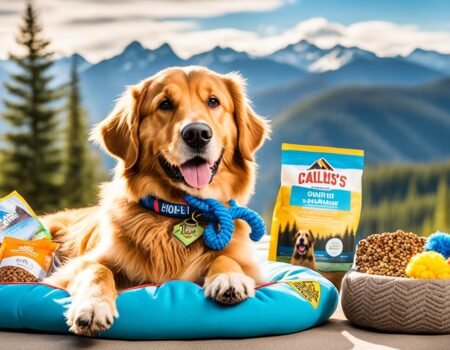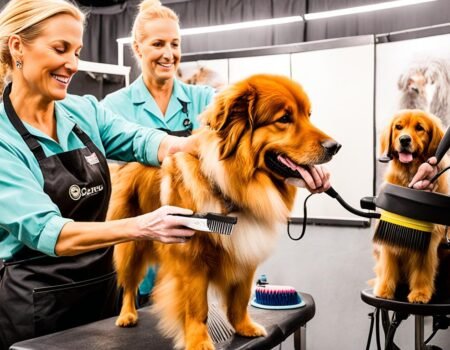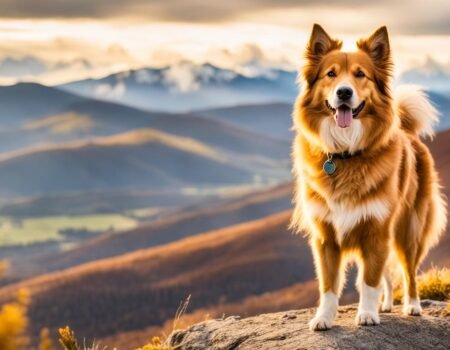Did you know that mushrooms, a common ingredient in many of our favorite recipes, can pose a serious risk to our canine companions? While some mushrooms are safe for dogs to eat, others can be highly toxic and potentially fatal. As responsible pet owners, it’s essential for us to understand the potential dangers and take necessary precautions to keep our furry friends safe.
Key Takeaways:
- Not all mushrooms are safe for dogs, and some can be highly toxic.
- Wild mushrooms pose a significant risk, and dogs should be kept away from areas where they grow.
- Symptoms of mushroom poisoning in dogs can vary and may include gastrointestinal upset, neurological symptoms, and even organ failure.
- Immediate veterinary care is crucial if you suspect your dog has ingested a toxic mushroom.
- Store-bought mushrooms, when cooked properly and served plain, can be safe for dogs in moderation.
Can Dogs Eat Wild Mushrooms?
Dogs should not eat wild mushrooms. Many wild mushrooms are toxic to dogs and can lead to fatal poisoning. It is crucial to be cautious and vigilant when walking your dog in areas where wild mushrooms grow. If your dog ingests a wild mushroom, immediate veterinary attention is necessary to ensure their safety and well-being.
While some mushrooms may be safe for human consumption, the same cannot be said for dogs. Dogs have different digestive systems and metabolisms, which can make them more susceptible to mushroom toxicity. It’s essential to understand the potential dangers that wild mushrooms pose to our furry friends.
“Many wild mushrooms are toxic to dogs and can lead to fatal poisoning.”
Wild mushrooms can be found in various environments, including forests, parks, and even your own backyard. They can blend in with the surrounding vegetation and may be challenging to distinguish from non-toxic mushrooms. Dogs are naturally curious creatures and may be tempted to investigate and even ingest these mushrooms during walks or outdoor playtime.
Wild mushroom poisoning in dogs can result in a range of symptoms, from mild gastrointestinal disturbances to severe neurological issues. The severity of the poisoning will depend on the specific mushroom species ingested and the amount consumed. It’s crucial not to underestimate the potential harm that wild mushrooms can cause to your dog’s health.
Dangers of Wild Mushrooms for Dogs
It’s important to note that not all wild mushrooms are toxic to dogs, but without proper knowledge, it can be challenging to differentiate between safe and harmful species. Even experienced foragers can struggle with mushroom identification.
There are several types of wild mushrooms that are known to be highly toxic to dogs. These include:
- Amanita phalloides (Death Cap)
- Galerina marginata (Deadly Galerina)
- Amanita gemmata (Jeweled Deathcap)
- Amanita muscaria (Fly Agaric)
and more. It’s vital to treat all wild mushrooms as potentially toxic and keep them out of your dog’s reach.
Signs of Mushroom Poisoning in Dogs
Mushroom poisoning in dogs can be characterized by a variety of symptoms. These symptoms may include:
- Gastrointestinal upset (vomiting, diarrhea)
- Sedation or increased activity
- Tremors or seizures
- Increased urination and salivation
- Watery eyes
- Neurological symptoms
The severity and combination of symptoms can vary depending on the specific mushroom species and the dog’s individual tolerance and sensitivity. It is crucial to monitor your dog closely and seek immediate veterinary care if you suspect mushroom poisoning.
Immediate Actions for Mushroom Poisoning
If you believe your dog has ingested a wild mushroom or is exhibiting symptoms of mushroom poisoning, it is crucial to take immediate action. Time is of the essence, and a quick response can make a significant difference in your dog’s outcome.
- Contact your veterinarian or a 24-hour animal poison control center for guidance.
- Be prepared to provide information about the mushroom species, the time of ingestion, and any symptoms observed.
- Follow the guidance provided by the professionals to induce vomiting or administer activated charcoal, if directed to do so.
- Seek immediate veterinary care for further evaluation and treatment.
Remember, it’s always better to be cautious and prevent mushroom ingestion than to risk your dog’s health. Keep a close eye on your surroundings and educate yourself about the local mushroom species in your area to ensure a safe environment for your furry companion.
What Kinds of Wild Mushrooms Are Toxic to Dogs?
When it comes to wild mushrooms, it’s crucial to be aware of the ones that can be toxic to our furry friends. Dogs are naturally curious creatures, and they may come across these dangerous mushrooms during their outdoor adventures. To keep your dog safe, it’s essential to know which wild mushrooms to avoid.
Here are some of the most toxic mushrooms for dogs:
| Mushroom Name | Toxicity Level |
|---|---|
| Amanita phalloides (death cap) | Highly toxic |
| Galerina marginata (deadly Galerina) | Highly toxic |
| Amanita gemmata (jeweled deathcap) | Highly toxic |
| Amanita muscaria (fly agaric) | Moderately toxic |
| Gyromitra spp. (false morel) | Moderately toxic |
| Inocybe spp. | Moderately toxic |
| Clitocybe dealbata | Moderately toxic |
These toxic mushrooms can cause a range of symptoms in dogs, from gastrointestinal upset to severe organ failure. It’s important to treat all wild mushrooms as potentially toxic and seek immediate veterinary help if your dog has ingested any of these species.
Remember, prevention is key when it comes to protecting your dog from toxic mushrooms. Stay vigilant during outdoor walks and keep your dog away from areas where wild mushrooms grow.
Symptoms of Mushroom Poisoning in Dogs
When it comes to mushroom poisoning in dogs, recognizing the symptoms is crucial for prompt veterinary care. The signs of mushroom poisoning can vary depending on the specific species of mushroom ingested. If you suspect your dog has eaten a toxic mushroom, be vigilant for the following symptoms:
- Gastrointestinal upset: Vomiting, diarrhea, and abdominal pain
- Sedation: Excessive sleepiness or lethargy
- Tremors: Involuntary shaking or trembling
- Seizures: Uncontrolled convulsions or fits
- Increased urination: Frequent or excessive urination
- Salivation and watery eyes: Excessive drooling and tearing
- Diarrhea: Loose or liquid bowel movements
- Neurological symptoms: Disorientation, stumbling, or difficulty walking
The severity of these symptoms can range from mild to life-threatening. It is important to remember that not all symptoms may be immediately evident, and some symptoms may take time to manifest after mushroom ingestion.
If you observe any of these signs in your dog and suspect mushroom poisoning, do not hesitate to seek immediate veterinary care. Time is of the essence when it comes to treating mushroom poisoning, and professional intervention is necessary to ensure the best possible outcome for your pet.
Expert Insight:
“Identifying the symptoms of mushroom poisoning in dogs is vital for initiating appropriate treatment. Gastrointestinal disturbances, sedation, tremors, and seizures are typical signs that warrant immediate veterinary attention. It’s important to remember that symptoms can vary depending on the species of mushrooms ingested, highlighting the need for quick diagnosis and proper medical care.”
– Dr. Emily Thompson, DVM
Treating Mushroom Poisoning in Dogs
When it comes to treating mushroom poisoning in dogs, the approach will vary depending on factors such as the type of mushroom ingested, the exhibited symptoms, and the time since ingestion. The priority is to provide immediate veterinary care to ensure the best chance of recovery for your furry friend.
If you suspect your dog has ingested a toxic mushroom, it’s important to act quickly. Contact your veterinarian or a 24-hour animal poison control center for guidance. They will provide instructions on the necessary steps to take, which may include inducing vomiting or administering activated charcoal to prevent further absorption of toxins.
In some cases, the veterinarian may recommend specific drugs to counteract the effects of the toxin and alleviate symptoms. Supportive care, such as intravenous fluids, may also be administered to manage dehydration and maintain electrolyte balance. Close monitoring of your dog’s condition will be essential throughout the treatment process.
In severe cases of mushroom poisoning, hospitalization and specialized treatment may be required. This can include continuous monitoring, intensive care, and the use of additional therapies to stabilize your dog’s condition. The veterinarian will tailor the treatment plan to meet the individual needs of your dog and ensure the best possible outcome.
Preventing Mushroom Poisoning in Dogs
Prevention is always better than cure when it comes to mushroom poisoning. To protect your dog from this potential danger, consider the following precautions:
- Avoid allowing your dog to roam freely in areas where wild mushrooms are prevalent, such as forests, parks, or your own backyard if mushrooms are known to grow there.
- Regularly inspect your outdoor spaces for the presence of mushrooms and promptly remove any that you find.
- Maintain a well-maintained and well-groomed yard to minimize the growth of mushrooms.
- Keep an eye on your dog during walks and prevent them from sniffing or attempting to eat unknown mushrooms.
- Train your dog to avoid picking up items from the ground, including mushrooms.
- Consider muzzling your dog during walks in areas where wild mushrooms are abundant, under the guidance of a professional trainer.
By taking these preventive measures, you can significantly reduce the risk of mushroom poisoning in your beloved canine companion.
| Type of Treatment | Description |
|---|---|
| Inducing Vomiting | A procedure performed to expel the ingested mushrooms from the dog’s system, preventing further absorption of toxins. |
| Administration of Activated Charcoal | Used to bind to the toxins in the gastrointestinal tract, reducing their absorption into the bloodstream. |
| Drug Therapy | Specific medications may be prescribed to counteract the effects of the toxin and manage symptoms such as seizures or liver damage. |
| Supportive Care | Intravenous fluids, electrolyte management, and other supportive measures to address dehydration and maintain proper organ function. |
Can Dogs Eat Store-Bought Mushrooms?
Store-bought mushrooms can be a tempting treat for your furry friend, but are they safe to eat? Let’s explore whether dogs can indulge in these delectable fungi.
Generally, store-bought mushrooms such as white button, portobello, and shiitake mushrooms are safe for dogs to eat when cooked properly. They can provide a nutritious addition to their diet. However, it is important to keep a few things in mind to ensure their safety and well-being.
Firstly, be cautious about the way you prepare mushrooms for your dog. Avoid adding any seasonings, oils, or ingredients like garlic or onions, as these can be harmful to dogs. Stick to plain, cooked mushrooms to prevent any potential digestive issues or toxic reactions. Remember, what might be harmless to humans could be harmful to our canine companions.
Additionally, store-bought mushrooms should not become a regular part of your dog’s diet. While they can be enjoyed as an occasional treat, it is important to maintain a balanced and nutritionally complete diet for your furry friend. Mushroom consumption should be in moderation and always as part of a well-rounded meal plan.
It is always a good idea to consult with your veterinarian before introducing any new foods to your dog’s diet, and mushrooms are no exception. They can provide guidance on safe portions, potential allergies, and other specific dietary considerations for your individual pet. Your veterinarian is the best resource for personalized advice based on your dog’s unique needs and health status.
In conclusion, store-bought mushrooms can be safe for dogs to eat when prepared properly and served in moderation. Remember to keep them plain, avoid harmful ingredients, and consult with your veterinarian for specific recommendations based on your dog’s needs. By practicing caution and providing a balanced diet, you can ensure that your furry friend enjoys their occasional mushroom treat without any adverse effects.
Safe Varieties of Mushrooms for Dogs
When it comes to mushrooms for dogs, safety is paramount. While some mushrooms are toxic to dogs, there are several safe varieties that can provide important nutrients. Here are some dog-friendly mushrooms that are considered safe when cooked properly and served plain:
- White button mushrooms
- Cremini mushrooms
- Portobello mushrooms
- Porcini mushrooms
- Reishi mushrooms
- Shiitake mushrooms
- Maitake mushrooms
These mushrooms contain valuable vitamins B and D, minerals, and antioxidants that can support your dog’s overall health. However, it’s crucial to cook them thoroughly and serve them without any additives or spices. Adding spices, oils, or other ingredients may be harmful to your furry friend.
Mushroom Nutritional Values:
| Mushroom Variety | Nutritional Value |
|---|---|
| White button mushrooms | High in antioxidants, vitamins B and D, and minerals such as potassium and selenium |
| Cremini mushrooms | Rich in antioxidants, vitamins B and D, and minerals like copper and manganese |
| Portobello mushrooms | Contain vitamins B and D, antioxidants, and minerals including phosphorus and magnesium |
| Porcini mushrooms | Offer vitamins B and D, antioxidants, and minerals like zinc and copper |
| Reishi mushrooms | Provide antioxidants, vitamins B and D, and minerals including potassium and calcium |
| Shiitake mushrooms | Rich in antioxidants, vitamins B and D, and minerals like iron and zinc |
| Maitake mushrooms | Contain vitamins B and D, antioxidants, and minerals including potassium and phosphorus |
Incorporating these safe varieties of mushrooms into your dog’s diet can be a healthy addition. However, always consult with your veterinarian before introducing any new foods to your dog’s diet, including mushrooms.
Wild Mushrooms to Avoid
When it comes to wild mushrooms and dogs, there are several varieties that can be extremely toxic and pose a significant threat to your furry friend’s health. It’s crucial to educate yourself about these dangerous wild mushrooms and take necessary precautions to keep your dog safe.
Here are some of the most toxic wild mushrooms for dogs that you should avoid:
- Amanita muscaria (Fly Agaric) – This iconic mushroom with its bright red cap and white spots may look appealing, but it contains dangerous toxins that can be lethal to dogs.
- False Morels – These mushrooms resemble edible morels but are highly toxic and can cause severe poisoning in dogs.
- Other Varieties – There are numerous other wild mushrooms that are known to be harmful to dogs, such as certain species of the Amanita genus. It’s best to avoid all wild mushrooms to be safe.
Prevention is key when it comes to protecting your dog from toxic wild mushrooms. Familiarize yourself with the appearance of these harmful mushrooms and be cautious when walking your dog in areas where they may grow.
Remember: The best way to keep your dog safe from toxic wild mushrooms is to stay vigilant and avoid letting them roam in areas where these mushrooms thrive.
Cooking Mushrooms for Dogs
When it comes to cooking mushrooms for dogs, we need to ensure safe preparation to protect our furry friends. Follow these guidelines to make mushrooms a healthy treat for your canine companion.
Thoroughly Cooked for Safety
It’s essential to cook mushrooms thoroughly before serving them to your dog. Cooking not only enhances the flavor but also eliminates potential toxins and makes them easier for dogs to digest. When mushrooms are properly cooked, they become a safe and nutritious addition to your dog’s diet.
Avoid Harmful Ingredients
When preparing mushrooms for your dog, it’s crucial to avoid adding any fats, spices, or ingredients that are toxic to dogs, such as garlic or onions. These can cause various health problems and should be kept out of their diet. Stick to plain, unseasoned mushrooms to ensure your dog’s well-being.
Bite-Sized Portions for Safety
To prevent choking hazards, cut the cooked mushrooms into small, bite-sized pieces. This makes it easier for your dog to eat and reduces the risk of any obstructions. Remember, dogs have a tendency to swallow food quickly, so providing appropriately sized portions is important to ensure their safety.
By following these safe cooking practices, you can enjoy serving mushrooms to your furry friend without any worries. Mushrooms can provide essential nutrients while being a tasty addition to your dog’s diet.
Signs of Mushroom Poisoning
If your dog has ingested a toxic mushroom, they may display various signs of mushroom poisoning. It is crucial to be aware of these symptoms and seek immediate veterinary care if you suspect mushroom poisoning.
| Symptoms of Mushroom Poisoning in Dogs: |
|---|
| Vomiting |
| Diarrhea |
| Abdominal pain |
| Weakness |
| Tremors |
| Seizures |
| Organ failure (in severe cases) |
| Coma or death (in severe cases) |
These symptoms can vary depending on the species of mushroom ingested and the severity of the poisoning. Immediate veterinary care is necessary to provide the best chances of recovery for your dog.
Note: The image above is for illustrative purposes only and does not represent a specific case of mushroom poisoning.
Immediate Actions for Mushroom Poisoning
If you suspect your dog has ingested a toxic mushroom, it is important to take immediate action. Time is of the essence when it comes to treating mushroom poisoning, so don’t delay in seeking professional help. Follow these immediate actions to ensure your dog’s safety:
- Contact your veterinarian or a 24-hour animal poison control center: Reach out to a professional for guidance and instructions on what to do next. They have the knowledge and experience to provide accurate advice based on the specific situation.
- Induce vomiting, if instructed: In some cases, your veterinarian may instruct you to induce vomiting to remove the toxic substances from your dog’s system. They will guide you on the correct procedure to follow.
- Administer activated charcoal, if recommended: Activated charcoal can help absorb toxins and prevent their absorption into your dog’s bloodstream. It is typically given orally and should only be administered under veterinary guidance.
- Provide supportive care: Offer comfort and reassurance to your dog while waiting for professional help. Keep them calm and monitor their behavior closely for any changes.
- Follow emergency treatment instructions: Depending on the severity of the poisoning, your veterinarian may instruct you to bring your dog in for emergency treatment. It is crucial to follow their guidance to give your dog the best chance of recovery.
Remember, every minute counts when dealing with mushroom poisoning. Do not hesitate to seek professional help if you suspect your dog has ingested a toxic mushroom. Together, we can ensure the safety and well-being of our furry companions.
| Immediate Actions for Mushroom Poisoning in Dogs |
|---|
| Contact your veterinarian or a 24-hour animal poison control center |
| Induce vomiting, if instructed |
| Administer activated charcoal, if recommended |
| Provide supportive care |
| Follow emergency treatment instructions |
Conclusion
In conclusion, when it comes to mushrooms and dogs, safety should be our top priority. While there are some mushrooms that are safe for dogs to eat, it is crucial to exercise caution and avoid allowing them to consume wild mushrooms. These can be highly toxic and pose serious health risks.
If you want to feed mushrooms to your furry friend, opt for store-bought varieties such as white button or shiitake mushrooms. Ensure they are cooked properly and served plain, without any harmful seasonings or ingredients. However, mushrooms should not replace a balanced diet for your dog, and it is always best to consult your veterinarian before introducing any new foods to their diet.
If your dog has ingested a toxic mushroom or is displaying symptoms of mushroom poisoning, such as vomiting or diarrhea, it is important to seek immediate veterinary care. Time is of the essence in treating mushroom poisoning, and the guidance of a professional is crucial in ensuring the well-being of your beloved pet.
Remember, being informed and taking proactive measures to protect your dog from mushroom toxicity will go a long way in keeping them safe and healthy. Always prioritize their well-being and consult with your veterinarian for personalized guidance regarding the safety of specific foods for your furry companion.
FAQ
Can dogs eat mushrooms?
While some mushrooms are safe for dogs to eat, others can be toxic and cause serious harm. It is important to be cautious and vigilant when it comes to feeding mushrooms to dogs.
Can dogs eat wild mushrooms?
No, dogs should not eat wild mushrooms. Many wild mushrooms are toxic to dogs and can lead to fatal poisoning. It is important to keep your dog away from areas where wild mushrooms grow.
What kinds of wild mushrooms are toxic to dogs?
Several types of wild mushrooms are toxic to dogs, including Amanita phalloides (death cap), Galerina marginata (deadly Galerina), Amanita gemmata (jeweled deathcap), Amanita muscaria (fly agaric), Gyromitra spp. (false morel), Inocybe spp., and Clitocybe dealbata. It is crucial to treat all wild mushrooms as potentially toxic and seek immediate veterinary help if your dog has ingested any of these species.
What are the symptoms of mushroom poisoning in dogs?
The symptoms of mushroom poisoning in dogs can vary depending on the species of mushroom ingested. Symptoms may include gastrointestinal upset, sedation, tremors, seizures, increased urination, salivation, watery eyes, diarrhea, and neurological symptoms. Immediate veterinary care is necessary as the severity of the symptoms can range from mild to life-threatening.
How is mushroom poisoning in dogs treated?
Veterinary treatment for mushroom poisoning in dogs will depend on various factors such as the type of mushroom ingested and the symptoms exhibited. Treatment may include inducing vomiting, administering drugs to counteract the toxin, providing supportive care to manage symptoms, and monitoring the dog’s condition until they recover. Severe cases may require hospitalization and specialized treatment.
Can dogs eat store-bought mushrooms?
Store-bought mushrooms such as white button, cremini, and shiitake mushrooms can be safe for dogs to eat when cooked properly. However, it is important to avoid adding any seasonings, oils, garlic, onions, or other harmful ingredients. It is recommended to consult with your veterinarian before introducing any new foods to your dog’s diet.
What are some safe varieties of mushrooms for dogs?
Some safe varieties of mushrooms for dogs include white button mushrooms, cremini mushrooms, portobello mushrooms, porcini mushrooms, reishi mushrooms, shiitake mushrooms, and maitake mushrooms. These mushrooms can provide important nutrients but should be plain and cooked properly before serving to dogs.
What wild mushrooms should dogs avoid?
Dogs should avoid toxic wild mushrooms such as amanita muscaria (fly agaric), false morels, and other varieties known to cause severe symptoms and even death. It is crucial to educate yourself about these dangerous wild mushrooms and keep your dog away from areas where they may grow.
How should mushrooms be cooked for dogs?
When cooking mushrooms for dogs, it is important to cook them thoroughly to eliminate potential toxins and make them easier for dogs to digest. Avoid adding fats, spices, garlic, onions, or other toxic ingredients. Cut the cooked mushrooms into small, bite-sized pieces to prevent choking hazards.
What are the signs of mushroom poisoning in dogs?
Signs of mushroom poisoning in dogs can include vomiting, diarrhea, abdominal pain, weakness, tremors, seizures, and in severe cases, organ failure, coma, or even death. It is crucial to be aware of these symptoms and seek immediate veterinary care if mushroom poisoning is suspected.
What immediate actions should be taken for mushroom poisoning?
If you suspect your dog has ingested a toxic mushroom, it is important to take immediate action. Contact your veterinarian or a 24-hour animal poison control center for guidance. They may instruct you to induce vomiting, administer activated charcoal, provide supportive care, or bring your dog in for emergency treatment.
Can dogs eat mushrooms as a regular part of their diet?
Mushrooms should not be a regular part of your dog’s diet. While some safe varieties can be included occasionally, it is important to consult with your veterinarian before introducing any new foods to your dog’s diet.











No Comment! Be the first one.